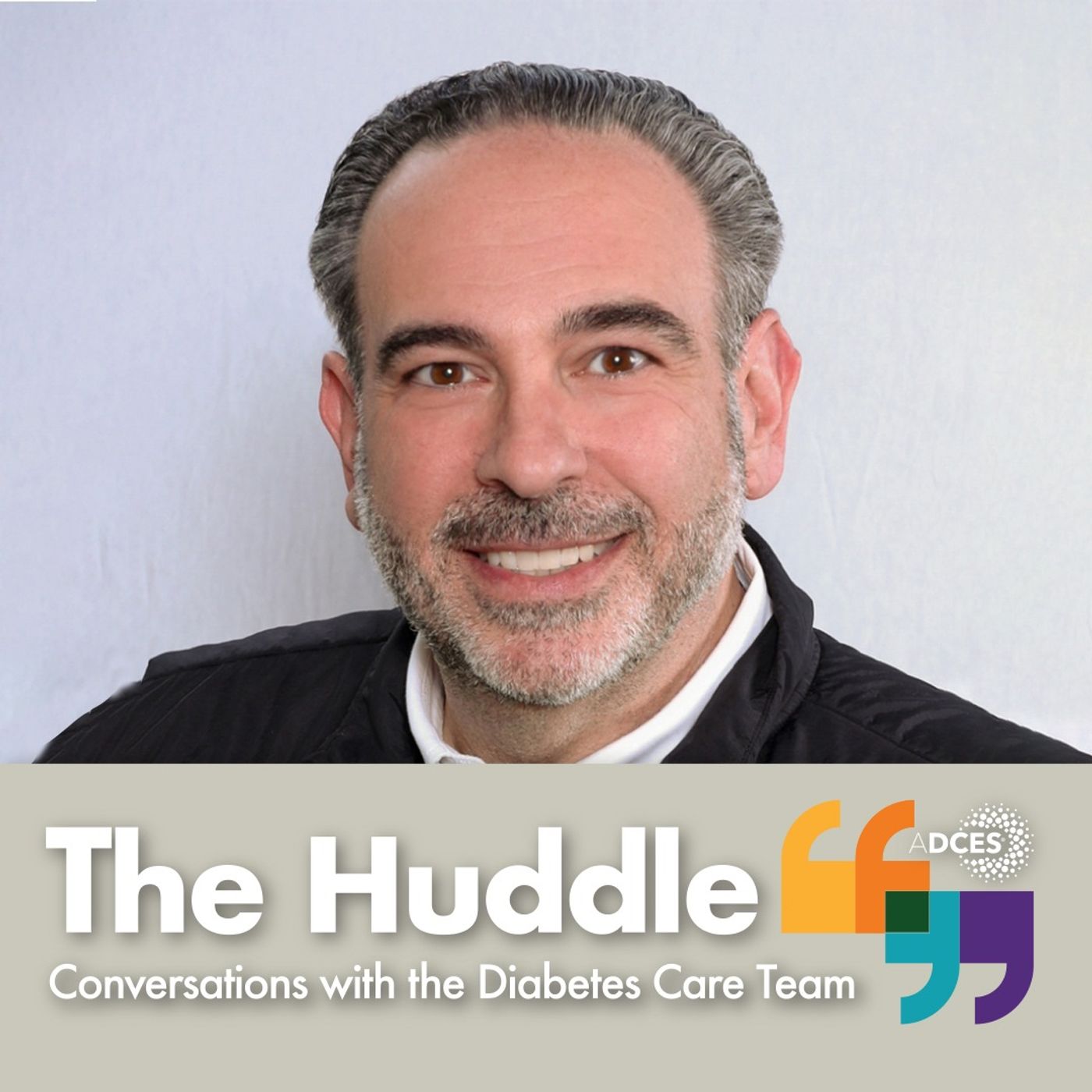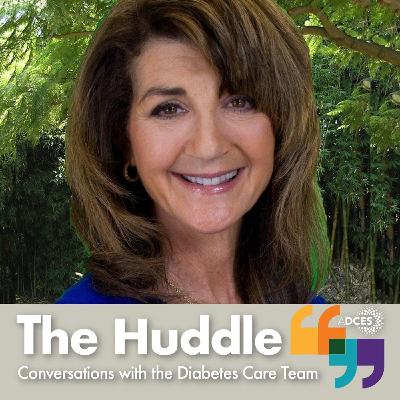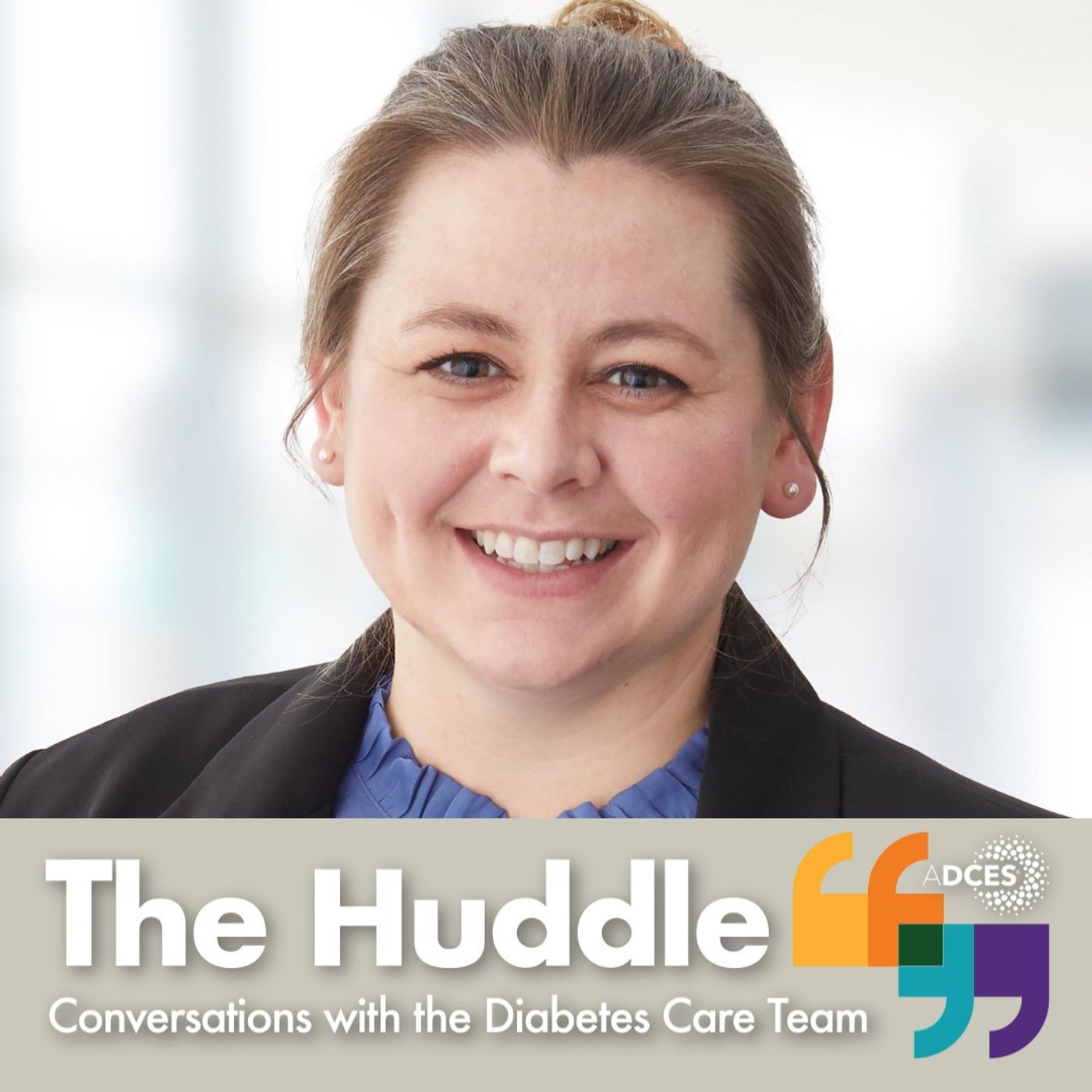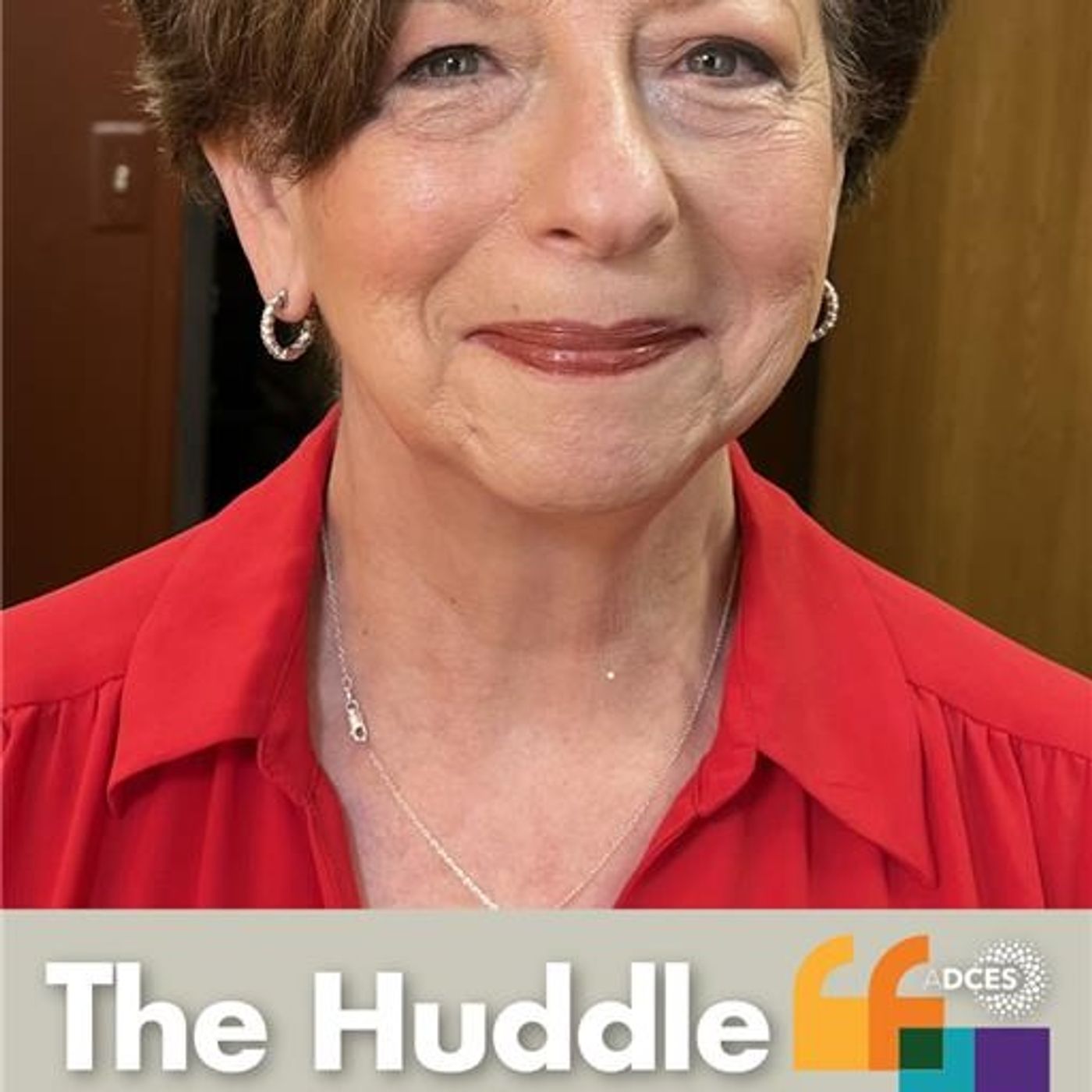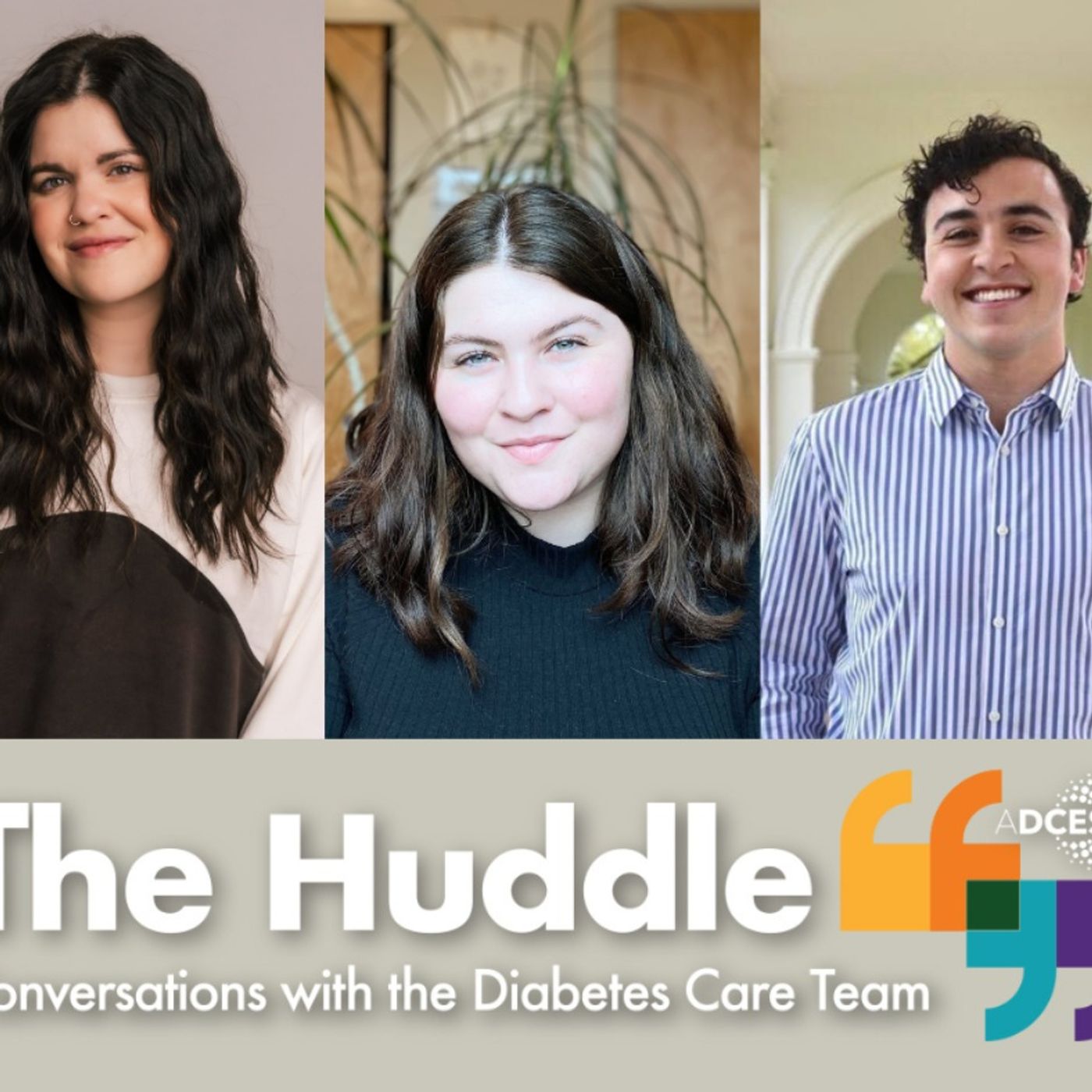Discover The Huddle: Conversations with the Diabetes Care Team
The Huddle: Conversations with the Diabetes Care Team

The Huddle: Conversations with the Diabetes Care Team
Author: Association of Diabetes Care & Education Specialists
Subscribed: 96Played: 2,202Subscribe
Share
© 2025 Association of Diabetes Care & Education Specialists
Description
The official podcast of the Association of Diabetes Care & Education Specialists. Join us as we discuss the latest news in diabetes care, education, advocacy and technology.
182 Episodes
Reverse
Kristine Batty, PHD, APRN, BC-ADM, CDCES, FADCES joins this episode of Danatech Talks–a special series from The Huddle– to provide a high-level overview on continuous glucose monitors (CGMs). Kristine touches on the basics of how CGMs work, what CGM devices are out there today, what the different devices measure, and how CGM technology impacts clinical decision making. This episode was supported by educational grant funding from Abbott.Explore the latest in diabetes technology as well as trainings and resources on danatech: danatech l Diabetes Technology Education for Healthcare ProfessionalsListen to the first episode of our Danatech Talks diabetes technology series: https://thehuddle.simplecast.com/episodes/basics-diabetes-technology-for-health-care-professionals
Listen to more episodes of The Huddle at adces.org/perspectives/the-huddle-podcast.Learn more about ADCES and the many benefits of membership at adces.org/join. Hosted by Simplecast, an AdsWizz company. See pcm.adswizz.com for information about our collection and use of personal data for advertising.
Join Gary Rothenberg, DPM, CDCES, CWS, and Jodi Lavin Tompkins, MSN, RN, BC-ADM, CDCES, for an insightful discussion on diabetes-related peripheral neuropathy. Dr. Rothenberg explores the clinical manifestations, risk factors, and diagnostic approaches to neuropathy, while highlighting strategies for effective patient engagement and self-care support. The conversation also introduces the pyramid of treatments and therapies—a practical framework to guide interventions for individuals affected by neuropathy. Tune in to enhance your understanding of diabetes-related peripheral neuropathy and access the accompanying patient education handout designed to support self-management and shared decision-making. This episode is supported by an education grant from Lexicon Pharmaceuticals. Disclosure: Gary is Director of Medical Affairs, Podimetrics, makers of an FDA device to measure for prevention of diabetes-related foot ulcer recurrence.
Listen to more episodes of The Huddle at adces.org/perspectives/the-huddle-podcast.Learn more about ADCES and the many benefits of membership at adces.org/join. Hosted by Simplecast, an AdsWizz company. See pcm.adswizz.com for information about our collection and use of personal data for advertising.
In this episode of The Huddle, Janice Baker, MBA, RDN, CDCES, CNSC, BC-ADM, joins Julia Socke, RDN, LDN, CDCES, for an insightful conversation on common nutrition myths and the importance of holistic diabetes care. Drawing on nearly 43 years of experience, Janice shares her evidence-based perspectives on topics like low-carb diets, artificial sweeteners, and protein. She also discusses her collaborative approach to working with other healthcare providers and highlights often-overlooked aspects of diabetes management—such as foot and dental care—that contribute to truly comprehensive patient support. Join us for an enlightening discussion that blends clinical expertise with practical strategies for whole-person diabetes care.
Listen to more episodes of The Huddle at adces.org/perspectives/the-huddle-podcast.Learn more about ADCES and the many benefits of membership at adces.org/join. Hosted by Simplecast, an AdsWizz company. See pcm.adswizz.com for information about our collection and use of personal data for advertising.
On this episode of Danatech Talks–a special series from The Huddle–Katrina Flaskerud, MS, RDN, LD, CDCES outlines some of the fundamentals of diabetes technology. Katrina provides a foundational overview of all of the devices out there today and how they differ from each other, how to have conversations with clients about what diabetes technology options may be best for them, and how diabetes care and education specialists and other health care professionals who are less familiar with diabetes technology can get started and learn more.This episode was supported by educational grant funding from Abbott.Explore the latest in diabetes technology as well as trainings and resources on danatech: danatech l Diabetes Technology Education for Healthcare Professionals
Listen to more episodes of The Huddle at adces.org/perspectives/the-huddle-podcast.Learn more about ADCES and the many benefits of membership at adces.org/join. Hosted by Simplecast, an AdsWizz company. See pcm.adswizz.com for information about our collection and use of personal data for advertising.
Join Dana Moreau and Davida Kruger, MSN, APN-BC, BC-ADM, co-chair of the Diabetes Technology Conference Planning Committee, as they dive into what makes DTC25 the must-attend event for diabetes professionals. Discover how the latest innovations in diabetes technology will be translated into real-world strategies you can apply in practice and hear how the conference fosters meaningful networking and collaboration among peers. Register for the Diabetes Technology Conference here: https://diabetestechconference.org/
Listen to more episodes of The Huddle at adces.org/perspectives/the-huddle-podcast.Learn more about ADCES and the many benefits of membership at adces.org/join. Hosted by Simplecast, an AdsWizz company. See pcm.adswizz.com for information about our collection and use of personal data for advertising.
Kat Lucas, Hannah Reidel, and Thomas Hallett from the Diabetes Link share the young adult perspective on living with diabetes; including building trust with the DCES, navigating financial issues, alcohol use, and more, and the excitement of traveling and moving to new cities – all while living with type 1. Our guests share their experiences coming of age while living with diabetes, and discuss the importance of building trust with the care team and some of the valuable benefits of working with a DCES. Kat, Hannah, and Thomas share insights on what they wish their care teams knew about living with type 1, and thoughts on how the DCES can show up and provide support as those with similar experiences come of age. The Diabetes Link Resource Hub is available here: Resource HubThe DSMES Program Finder is available here: Find an Accredited Diabetes Education Program
Listen to more episodes of The Huddle at adces.org/perspectives/the-huddle-podcast.Learn more about ADCES and the many benefits of membership at adces.org/join. Hosted by Simplecast, an AdsWizz company. See pcm.adswizz.com for information about our collection and use of personal data for advertising.
Jasmine Gonzalvo, PharmD, MPH, CDCES, FADCES, and Honey Yang Estrada, MPH, CHW, join this episode to discuss the vital role of community health workers (CHWs) in diabetes care. They share strategies for recruiting CHWs, integrating them into interprofessional care teams, and leveraging their lived experience to build trust and address barriers beyond the clinic walls. The conversation emphasizes listening to CHWs, fostering sustainable partnerships, and shifting power to communities—not just checking a box—to reduce disparities and drive better outcomes.
Listen to more episodes of The Huddle at adces.org/perspectives/the-huddle-podcast.Learn more about ADCES and the many benefits of membership at adces.org/join. Hosted by Simplecast, an AdsWizz company. See pcm.adswizz.com for information about our collection and use of personal data for advertising.
Jasmine Gonzalvo, PharmD, MPH, CDCES, FADCES, joins this episode to discuss the importance of curiosity, effective communication and cultural sensitivity in diabetes care. She shares her personal approach to exploring barriers to insulin in clients and highlights how motivational interviewing can be a powerful tool in navigating treatment conversations—especially when addressing common misconceptions about insulin. The conversation emphasizes the importance of open-ended questions, recognizing personal biases, and creating safe spaces for honest dialogue. By nurturing relationships and meeting patients where they are, diabetes care and education specialists can better support lasting behavior change and improve health outcomes.This episode is sponsored by Lilly. ResourcesA link to the insulin myths tip sheet mentioned in this episode is coming soon. ReferencesNahid Dehghan-Nayeri, Fatemeh Ghaffari, Tahereh Sadeghi, Naser Mozaffari; Effects of Motivational Interviewing on Adherence to Treatment Regimens Among Patients With Type 1 Diabetes: A Systematic Review. Diabetes Spectr 1 May 2019; 32 (2): 112–117.Guy E H M Rutten, Heidi Van Vugt, Eelco de Koning - Person-centered diabetes care and patient activation in people with type 2 diabetes: BMJ Open Diabetes Research & Care 2020;8:e001926.Entwistle VA, Carter SM, Cribb A, McCaffery K. Supporting patient autonomy: the importance of clinician-patient relationships. J Gen Intern Med. 2010 Jul;25(7):741-5. doi: 10.1007/s11606-010-1292-2. Epub 2010 Mar 6. PMID: 20213206; PMCID: PMC2881979.
Listen to more episodes of The Huddle at adces.org/perspectives/the-huddle-podcast.Learn more about ADCES and the many benefits of membership at adces.org/join. Hosted by Simplecast, an AdsWizz company. See pcm.adswizz.com for information about our collection and use of personal data for advertising.
Becky Sulik, RDN, LD, CDCES, and Bethany Long, BSN, RN, CDCES, join us to discuss how automated insulin delivery systems (AID), like the Omnipod 5, are transforming diabetes management and making mealtime bolusing easier. Becky and Bethany share insights on the Omnipod 5 AID system, including user-friendly built-in features that facilitate onboarding and increase carb awareness skills in a variety of people with diabetes. The episode highlights real-world applications and personal stories that diabetes care and education specialists can utilize in practice to quickly onboard and empower their clients today. This episode was supported by Insulet. A guest featured on this show has a commercial relationship with Insulet, and another guest is an employee of the company. The opinions expressed in this webinar are those of the speakers and do not reflect the views or positions of Insulet.Resources: Omnipod resources for healthcare professionals: www.omnipod.com/hcp Omnipod 5 Custom Foods blog post: www.omnipod.com/hcp/blog/tips-guidelines/custom-foods Omnipod 5 Custom Foods brochure: www.omnipod.com/sites/default/files/omnipod-5_hcp_custom-foods-guide_us-english.pdf Omnipod 5 simulator app for iOS: apps.apple.com/us/app/omnipod-5-simulator/id1552469689 Omnipod 5 simulator app on Google Play: play.google.com/store/apps/details?id=com.insulet.simulator&hl=en_US&gl=US&pli=1 References: Davis GM, et al. Simplified Meal Bolus Strategies for the Omnipod®5 Automated Insulin Delivery (AID) System in People with Type 2 Diabetes (T2D): Sub-Analysis of the SECURE-T2D Study. Presented at: ATTD; March 19-22, 2025; Amsterdam, NL. Post-hoc analysis limits conclusions. Insulet Data on file. RF-062025-00012Important safety information: The Omnipod® 5 Automated Insulin Delivery System is a single hormone insulin delivery system intended to deliver U-100 insulin subcutaneously for the management of type 1 diabetes in persons aged 2 and older requiring insulin and type 2 diabetes in persons aged 18 and older. Rx only. WARNING: Do not use SmartAdjust™ technology for people under the age of 2 or who require less than 5 U of insulin per day. Visit omnipod.com/safety for complete safety information.
Listen to more episodes of The Huddle at adces.org/perspectives/the-huddle-podcast.Learn more about ADCES and the many benefits of membership at adces.org/join. Hosted by Simplecast, an AdsWizz company. See pcm.adswizz.com for information about our collection and use of personal data for advertising.
On this episode of the Huddle, Kelly Postiglione Cook, RN, MSN, ANP-BC, CDCES, BC-ADM, and Sean Oser, MD, MPH, CDCES have a conversation about the importance of utilizing automated insulin delivery systems, like the iLet bionic pancreas, more widely in primary care. They provide insight into a study that evaluated the success of implementing use of the iLet bionic pancreas in a primary care setting, how the results illustrated that this technology can be more widely utilized in these settings, and the role diabetes care and education specialists can play in this work.This episode is sponsored by Beta Bionics. Episode References: Bionic Pancreas Research Group. Multicenter, randomized trial of a bionic pancreas in type 1 diabetes. N Engl J Med 2022;387:1161-1172 DOI: 10.1056/NEJMoa2205225 Russell SJ, Selagamsetty R, Damiano E. Real-world efficacy of the iLet bionic pancreas in adults and children during the first eighteen months of commercial availability. Presented at the American Diabetes Association 85th Scientific Sessions, June 20-23, 2025, Chicago, IL. Oser SM, Putman MS, Russel SJ, et al. Assessing the iLet Bionic Pancreas deployed in primary care and via telehealth: a randomized clinical trial. Clin Diabetes 2025; cd240104. https://doi.org/10.2337/cd24-0104 Oser C, Parascando JA, Kostiuk M, et al. Experiences of people with type 1 diabetes using the iLet bionic pancreas in primary care: A qualitative analysis. Clin Diabetes 2024 https://doi.org/10.2337/cd24-0060. Sulik B, Postiglione Cook K, MacLeod J. Meals no longer need to be math problems: Shifting from precise carbohydrate counting to a continuum of carbohydrate awareness as automated insulin delivery advances. Diabetes Technology and Obesity Medicine 2025;1(1):79-83. DOI: 10.1089/dtom.2025.0010. Resources:Learn more about Beta Bionics here: https://www.betabionics.com/Explore the latest in diabetes technology on danatech: danatech l Diabetes Technology Education for Healthcare ProfessionalsLearn more about a two-part course on integrating diabetes technology into primary care, put on through the collaboration of AANP and ADCES:Part 1: Integrating Diabetes Technology into Primary Care Part 1: Overview and Clinical ScenariosPart 2: Integrating Diabetes Technology into Primary Care Part 2: Interactive Case StudiesDive deeper into how diabetes technology can be incorporated into primary care on another recent episode of The Huddle featuring Kathryn Evans Kreider DNP, FNP-BC, BC-ADM, FAANP: https://thehuddle.simplecast.com/episodes/embracing-diabetes-technology-in-primary-care
Listen to more episodes of The Huddle at adces.org/perspectives/the-huddle-podcast.Learn more about ADCES and the many benefits of membership at adces.org/join. Hosted by Simplecast, an AdsWizz company. See pcm.adswizz.com for information about our collection and use of personal data for advertising.
On the latest episode of The Huddle, we’re joined by Jay Shubrook, DO, BC-ADM, FACOFP, FAAFP, Anne Lee, MEd, RDN, CDCES, and Clipper Young, PharmD, MPH, as they talk about Touro University’s unique Mobile Diabetes Education Center (MOBEC). They explain how the center was formed, the services MOBEC provides, and how others can replicate this work to serve and educate a greater population of people with and at risk for diabetes.Learn more about MOBEC here: Touro University Californiahttps://diabetesjournals.org/clinical/article/42/1/125/153645/Community-Based-Diabetes-Awareness-Strategy-With
Listen to more episodes of The Huddle at adces.org/perspectives/the-huddle-podcast.Learn more about ADCES and the many benefits of membership at adces.org/join. Hosted by Simplecast, an AdsWizz company. See pcm.adswizz.com for information about our collection and use of personal data for advertising.
On this episode of The Huddle, Wendy Mobley-Bukstein, PharmD, BCACP, CDCES, CHWC, NASM-CPT, FAPhA, FADCES and Debbie Hinnen, APN, BC-ADM, CDCES, FAAN discuss the importance of medication persistence, how to talk to clients about starting and staying on diabetes medications, and strategies to help clients stay consistent with their medication taking. This episode was made possible with support from Lilly, A Medicine Company.Learn more about the latest in diabetes technology on danatech: danatech l Diabetes Technology Education for Healthcare ProfessionalsLearn more about the ADCES7 Self-Care Behaviors: Self-Care Tips (ADCES7)Learn more by reviewing the Importance of Starting and Staying on Type 2 Diabetes Medicine tip sheet, also available in European Spanish and Latin American Spanish. References:Kennedy-Martin, T., Boye, K. S., & Peng, X. (2017). Cost of medication adherence and persistence in type 2 diabetes mellitus: a literature review. Patient Preference and Adherence, 11, 1103–1117. https://doi.org/10.2147/PPA.S136639McGovern, A., Hinton, W., Calderara, S. et al. A Class Comparison of Medication Persistence in People with Type 2 Diabetes: A Retrospective Observational Study. Diabetes Ther 9, 229–242 (2018). https://doi.org/10.1007/s13300-017-0361-5Evans M, Engberg S, Faurby M, Fernandes JDDR, Hudson P, Polonsky W. Adherence to and persistence with antidiabetic medications and associations with clinical and economic outcomes in people with type 2 diabetes mellitus: A systematic literature review. Diabetes Obes Metab. 2022; 24(3): 377-390. doi:10.1111/dom.14603Sabaté E., Adherence to Long-Term Therapies: Evidence for Action, 2003, World Health Organization, Geneva, Switzerland.https://www.ama-assn.org/delivering-care/physician-patient-relationship/8-reasons-patients-dont-take-their-medicationshttps://www.npr.org/sections/health-shots/2017/09/08/549414152/why-do-people-stop-taking-their-meds-cost-is-just-one-reasonhttps://www.adces.org/docs/default-source/handouts/adces7/handout_pwd_adces7_takingmedication.pdf?sfvrsn=4e3f6359_13
Listen to more episodes of The Huddle at adces.org/perspectives/the-huddle-podcast.Learn more about ADCES and the many benefits of membership at adces.org/join. Hosted by Simplecast, an AdsWizz company. See pcm.adswizz.com for information about our collection and use of personal data for advertising.
This week on The Huddle, we're resharing an episode from last summer featuring Kristine Batty, PHD, APRN, BC-ADM, CDCES, FADCES as she discusses her experience both living with Type 1 diabetes and working with people with diabetes as a certified diabetes care and education specialist. She shares the importance of putting yourself in your client's shoes in order to understand their goals and pain points and support their needs, especially when it comes to diabetes technology.Visit danatech here: danatech l Diabetes Technology Education for Healthcare ProfessionalsLearn more about the latest developments in T1D screening here: T1D ScreeningView Kristine's video series below:https://www.youtube.com/watch?v=HPqraDx-aQwhttps://www.youtube.com/watch?v=SBYpv3LuzBwhttps://www.youtube.com/watch?v=otRUIrx6FkIhttps://www.youtube.com/watch?v=uDrDSSK99-A
Listen to more episodes of The Huddle at adces.org/perspectives/the-huddle-podcast.Learn more about ADCES and the many benefits of membership at adces.org/join. Hosted by Simplecast, an AdsWizz company. See pcm.adswizz.com for information about our collection and use of personal data for advertising.
Registration is open now for ADCES25 taking place August 8-11 in Phoenix, AZ! Our conference planning chair Christina Whitehouse, RN, MSN, APRN, ARNP, FADCES, CDCES, shares what to look forward to at this year's conference, and why ADCES' annual conference is the place to be for all diabetes care and education specialists and other professionals in the diabetes space. Register for this year’s annual conference at ADCES 2025 Annual MeetingExplore all there is to see in Phoenix at Roosevelt Row Arts District | Downtown Phoenix
Listen to more episodes of The Huddle at adces.org/perspectives/the-huddle-podcast.Learn more about ADCES and the many benefits of membership at adces.org/join. Hosted by Simplecast, an AdsWizz company. See pcm.adswizz.com for information about our collection and use of personal data for advertising.
On this episode of The Huddle, Chris Memering, MSN, RN, CDCES, BC-ADM, talks about the value that diabetes care and education specialists bring to the inpatient care setting. She outlines the importance of continuity of care between the inpatient and outpatient setting, how DCES in inpatient help increase patient satisfaction and safety, and how others in the inpatient setting can demonstrate their value to their hospital leadership.Learn more about how to showcase the value of the diabetes care and education specialty in our value toolkit created especially for ADCES members. Log in here to view the toolkit: Showcase Value ToolkitOr click here to become an ADCES member to access helpful resources like this one: MembershipLearn more about ADCES' inpatient certificate program focused on knowledge and skills necessary for effective inpatient diabetes care: https://www.adces.org/store/certificate-programs/detail/inpatient-certificate-program-transforming-care-and-enhancing-lives
Listen to more episodes of The Huddle at adces.org/perspectives/the-huddle-podcast.Learn more about ADCES and the many benefits of membership at adces.org/join. Hosted by Simplecast, an AdsWizz company. See pcm.adswizz.com for information about our collection and use of personal data for advertising.
This week on The Huddle, we're resharing a discussion with current ADCES President, Veronica Brady, PhD, FNP-BC, BC-ADM, CDCES, FADCES. Veronica discussed the concept of unconscious bias, how it shows up in our everyday lives and in working as health care professionals, and how we can practice cultural humility to better serve the needs of people with and at risk for diabetes.
Listen to more episodes of The Huddle at adces.org/perspectives/the-huddle-podcast.Learn more about ADCES and the many benefits of membership at adces.org/join. Hosted by Simplecast, an AdsWizz company. See pcm.adswizz.com for information about our collection and use of personal data for advertising.
In the first episode in a multi-part diabetes technology series, Kathryn Evans Kreider DNP, FNP-BC, BC-ADM, FAANP, joins The Huddle to discuss integrating diabetes technology into primary care. She talks about the importance of embracing digital technology in primary care and how health care professionals in primary care can take tangible steps to better utilize the technology available to them.Learn about the latest advances in diabetes technology on danatech: Diabetes technology for healthcare professionals | DanatechCheck out the two-part Integrating Diabetes Technology into Primary Care course here: Part 1: Integrating Diabetes Technology into Primary Care Part 1: Overview and Clinical ScenariosPart 2: Integrating Diabetes Technology into Primary Care Part 2: Interactive Case Studies
Listen to more episodes of The Huddle at adces.org/perspectives/the-huddle-podcast.Learn more about ADCES and the many benefits of membership at adces.org/join. Hosted by Simplecast, an AdsWizz company. See pcm.adswizz.com for information about our collection and use of personal data for advertising.
Michael See MS, ACSM-CEP, NBCHWC, CDES joins the Huddle to share his expertise and experiences in bringing physical activity to people with type 2 diabetes who also have physical limitations. He covers topics like how to assess physical limitations, their prevalence in people with type 2 diabetes, and how to use a motivational interviewing approach in conversations with your clients. This episode was made possible with support from Lilly, A Medicine Company. Learn more about this topic in our latest patient/client handout (support for the development of this handout was provided by Lilly, A Medicine Company): adces_tipsheet_physical_activity2.pdf ReferencesAmerican Diabetes Association Professional Practice Committee; 5. Facilitating Positive Health Behaviors and Well-being to Improve Health Outcomes: Standards of Care in Diabetes—2024. Diabetes Care 1 January 2024; 47 (Supplement_1): S77–S110.Ahmad E, Sargeant JA, Yates T, Webb DR, Davies MJ. Type 2 Diabetes and Impaired Physical Function: A Growing Problem. Diabetology. 2022; 3(1):30-45. https://doi.org/10.3390/diabetology3010003Angulo, J., Assar, M. E., Álvarez-Bustos, A., & Rodríguez-Mañas, L. (2020). Physical activity and exercise: Strategies to manage frailty. Redox Biology, 35. https://doi.org/10.1016/j.redox.2020.101513Colberg SR, Sigal RJ, Yardley JE, et al. Physical Activity/Exercise and Diabetes: A Position Statement of the American Diabetes Association. Diabetes Care. 2016;39(11):2065-2079. doi:10.2337/dc16-1728O'Neill D, Forman DE. The importance of physical function as a clinical outcome: Assessment and enhancement. Clin Cardiol. 2020;43(2):108-117. doi:10.1002/clc.23311Pedersen BK, Saltin B. Exercise as medicine - evidence for prescribing exercise as therapy in 26 different chronic diseases. Scand J Med Sci Sports. 2015;25 Suppl 3:1-72. doi:10.1111/sms.1258136-Item Short form survey instrument (SF-36). Available at: https://www.rand.org/content/dam/rand/www/external/health/surveys_tools/mos/mos_core_36item_survey.pdf (Accessed: 21 October 2024). Physical activity vital sign. Available at: https://www.exerciseismedicine.org/wp-content/uploads/2021/04/EIM-Physical-Activity-Vital-Sign.pdf (Accessed: 21 October 2024).
Listen to more episodes of The Huddle at adces.org/perspectives/the-huddle-podcast.Learn more about ADCES and the many benefits of membership at adces.org/join. Hosted by Simplecast, an AdsWizz company. See pcm.adswizz.com for information about our collection and use of personal data for advertising.
Eileen Egan, DNP, FNP-C, BC-ADM, CDCES, FADCES joins The Huddle to share her expertise about the interplay between weight and glycemic management in people with Type 2 diabetes, the importance of meeting glycemic and weight goals early after a Type 2 diabetes diagnosis, as well as best practices for helping people stay motivated and engaged. This episode was made possible with support from Lilly, A Medicine Company. Learn more about this topic in this accompanying patient/client handout (support for the development of this handout was provided by Lilly, A Medicine Company): adces_tipsheet_early_control2.pdf References:American Diabetes Association. Obesity and weight management for the prevention and treatment of type 2 diabetes: standards of care in diabetes- 2024. Diabetes Care, 47(1): S145-S157.Center for Disease Control and Prevention. Adult overweight and obesity. https://www.cdc.gov/obesity/basics/adult-defining.htmlDCCT/EDIC study research group. Intensive Diabetes Treatment and Cardiovascular Outcomes in Type 1 Diabetes: The DCCT/EDIC Study 30-Year Follow-up. Diabetes Care. 2016;39(5):686-693. Gregg E, Jakicic J, Blackburn G, et al. Association of the magnitude of weight loss and changes in physical fitness with long-term cardiovascular disease outcomes in overweight or obese people with type 2 diabetes: a post hoc analysis of the Look AHEAD randomized clinical trial. Lancet Diabetes Endocrinol. 2016; 4(11): 913-921.Gutiérrez-Cuevas J, Santos A, Armendariz-Borunda J. Pathophysiological Molecular Mechanisms of Obesity: A Link between MAFLD and NASH with Cardiovascular Diseases. Int J Mol Sci. 2021. 27;22(21):11629.Howard BV, Ruotolo G, Robbins DC. Obesity and dyslipidemia. Endocrinol Metab Clin North Am. 2003;32(4):855-867. Jin X, et al. Pathophysiology of obesity and its associated diseases. Acta Pharm Sin B. 2023;13(6):2403-2424. Laiteerapong N, Ham SA, Gao Y, et al. The legacy effect in type 2 diabetes: impact of early glycemic control on future complications (The Diabetes & Aging Study). Diabetes Care. 2019;42(3):416-426.Lean MEJ, Leslie WS, Barnes AC, et al. Primary care-led weight management for remission of type 2 diabetes (DiRECT): an open-label, cluster-randomised trial.Lancet Diabetes Endocrinol. 2019;7(5):344-355.Lingvay I, Sumithran P, Cohen RV, le Roux CW. Obesity management as a primary treatment goal for type 2 diabetes: time to reframe the conversation. Lancet. 2022 Jan 22;399(10322):394-405. doi: 10.1016/S0140-6736(21)01919-X. Epub 2021 Sep 30. Erratum in: Lancet. 2022 Jan 22;399(10322):358. PMID: 34600604Rachel G. Miller, Trevor J. Orchard; Understanding Metabolic Memory: A Tale of Two Studies. Diabetes 1 March 2020; 69 (3): 291–299. https://doi.org/10.2337/db19-0514Ross, R., Neeland, I.J., Yamashita, S. et al. Waist circumference as a vital sign in clinical practice: a Consensus Statement from the IAS and ICCR Working Group on Visceral Obesity. Nat Rev Endocrinol16, 177–189 (2020). https://doi.org/10.1038/s41574-019-0310-7Thom G, McIntosh A, Messow CM, et al. Weight loss-induced increase in fasting ghrelin concentration is a predictor of weight regain: Evidence from the Diabetes Remission Clinical Trial (DiRECT). Diabetes Obes Metab. 2021;(23):711-719.Tsai AG, Bessesen DH. Obesity. Ann Intern Med. 2019;170(5):ITC33-ITC48.Wing RR, Bolin P, Brancati FL, et al. Cardiovascular effects of intensive lifestyle intervention in type 2 diabetes. N Engl J Med. 2013;369(2):145-154.World Health Organization. Obesity. https://www.who.int/health-topics/obesity#tab=tab_1
Listen to more episodes of The Huddle at adces.org/perspectives/the-huddle-podcast.Learn more about ADCES and the many benefits of membership at adces.org/join. Hosted by Simplecast, an AdsWizz company. See pcm.adswizz.com for information about our collection and use of personal data for advertising.
On our latest episode of The Huddle, Sheetal Shah, founder of MettaHealth Partners discusses the evolving realm of AI, the role DCESs and other health care professionals can play in embracing and adopting AI technology, and the importance of keeping a human element in the technology.Learn more about MettaHealth Partners here: MettaHealth PartnersLearn more about the National Institute of Standards and Technology (NIST) here: National Institute of Standards and TechnologyStay up to date on all things related to diabetes technology on danatech: Diabetes technology for healthcare professionals | Danatech
Listen to more episodes of The Huddle at adces.org/perspectives/the-huddle-podcast.Learn more about ADCES and the many benefits of membership at adces.org/join. Hosted by Simplecast, an AdsWizz company. See pcm.adswizz.com for information about our collection and use of personal data for advertising.



